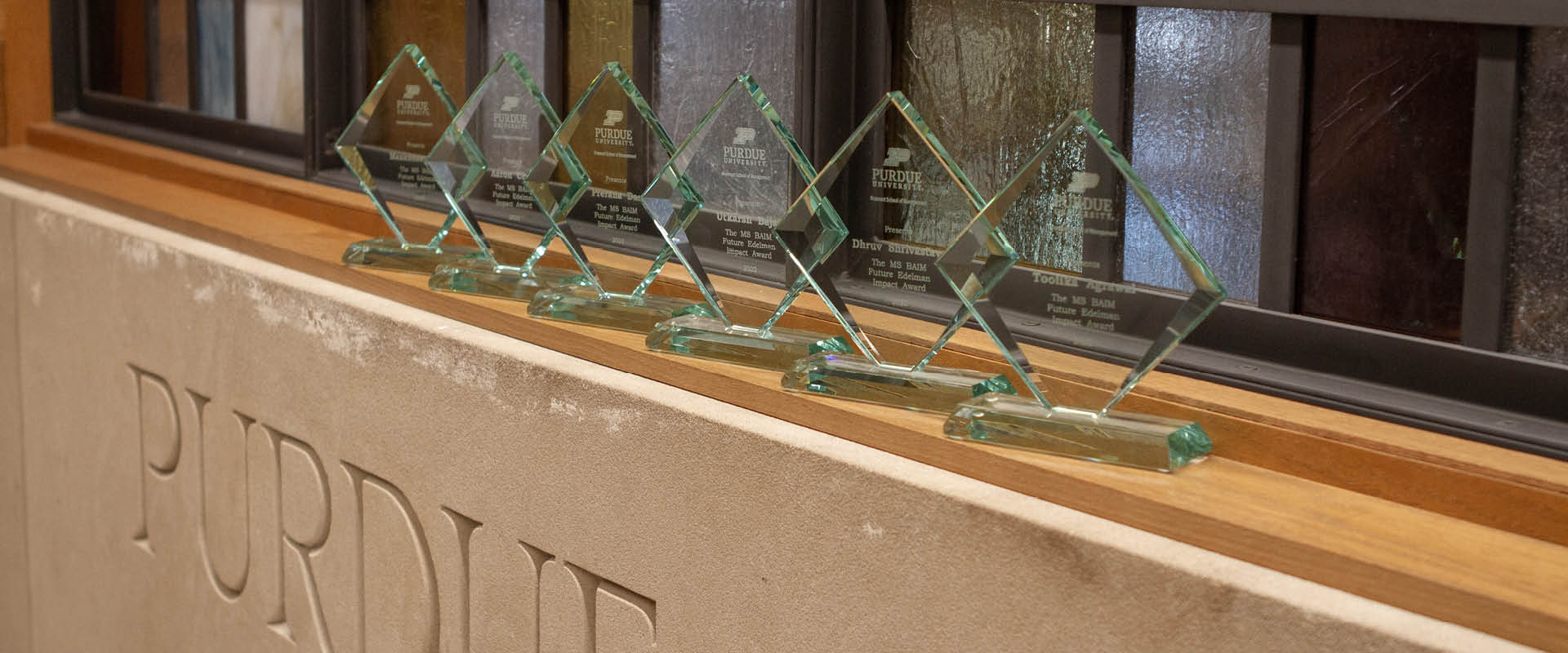
06-21-2022
No retailer wants to stock its shelves with products that aren’t selling, but it’s a challenge for businesses to come up with just the right inventory balance. Using data from one national retailer’s top-performing stores, a group of students in Krannert’s Master of Science in Business Analytics and Information Management (MSBAIM) program found a solution they estimate could lead to an 11 percent profit increase for the company.
The students won MSBAIM’s inaugural Future Edelman Impact Award competition for their work.
The Future Edelman Award – named after the prestigious Franz Edelman Award for Achievement in Advanced Analytics, Operations Research, and Management Science of the Institute for Operations Research and the Management Sciences (INFORMS) – had MSBAIM student teams compete against each other to not only use data analytics to solve a common business problem, but also to explain the solution to a lay audience on YouTube.
There were two phases of the Future Edelman competition: First, students created posters and short videos of their capstone projects that were judged by corporate partners that work with MSBAIM. Next, the top three student groups from the first phase created three-minute YouTube videos about their projects. The winning team was the one with the most likes for its video after a week on YouTube.
Practical solutions with wide applicability
The first Future Edelman award went to Dhruv Shrivastava, Aaron Chen, Utkarsh Bajaj, Toolika Agarwal, Manandeep Gill, and Prerana Das. Das anticipates that each of the company’s stores can increase its profits on average about $138,000 per year by implementing the team’s product assortment recommendations. She notes that could add up to more than $6 million across the 5,000 stores the team analyzed.
“This victory meant that we learned optimization in the right way and could present it such that reached to a larger audience,” says Das. “It boosted our confidence in working on data science or advanced analytics problems in real world scenarios.”
One of the other finalist teams worked with a data science consulting firm to create a tool for automated A-B testing, while the third team used artificial intelligence natural language analysis to help a healthcare research and development company more efficiently identify patent applications that may be infringing the company’s patents.
While the teams worked with companies in specific industries, their solutions have potential for wider applicability. For example, the patent infringement detection software could also be used to identify plagiarism.
Communication skills key for future careers
According to Matthew Lanham, academic director of the MSBAIM program and clinical assistant professor of management, one of the main skills developed through the competition was communicating analytical results and recommendations with clients who aren’t data scientists. He says the focus for the students was, “Did you find the right balance of rigor, technical jargon, and layman language so that your audience can actually appreciate the work performed and the takeaways from it?”
Padma Dwivedi worked on the A-B testing solution. Her team found it challenging to compress a “three-month journey into a three-minute video” that emphasized the benefits of their project rather than the data analysis. To illustrate the team’s approach, she quotes Denzel Washington’s character, attorney Joe Miller, from her favorite movie, “Philadelphia.” Miller’s catchphrase was, “Explain it to me like I’m a four-year-old.”
“It’s a real client,” Das notes. Although she and her team used algorithms and complex data to solve the product mix problem, she says the focus of their communications with the client was on the business impact.
Lanham knows what it takes to compete in the actual Edelman competition, which he says is “basically the Nobel Prize of applied analytics.” He has coached Edelman Award competitors and notes that no matter how technically proficient competitors are, they can’t win if they don’t know how to present their ideas. He hopes the Future Edelman competition has planted a seed in his students’ minds, noting, “I really want to see one of our alumni be a real Edelman one day.”
Benefit for partner companies
According to Lanham, the companies that work with MSBAIM students benefit from a fresh view of their challenges from an unbiased, outside viewpoint. He also notes that working with companies during the MSBAIM program can lead to employment after graduation.
“One thing that we didn’t expect was the level of client involvement and interest,” notes Lakshay Vohra, who worked on the patent infringement detection tool. “The level of interest and involvement they had within a project like this one showed how the industry perception and acceptance for data science has evolved over the years. This is good news for professionals like us who are just entering this space.”